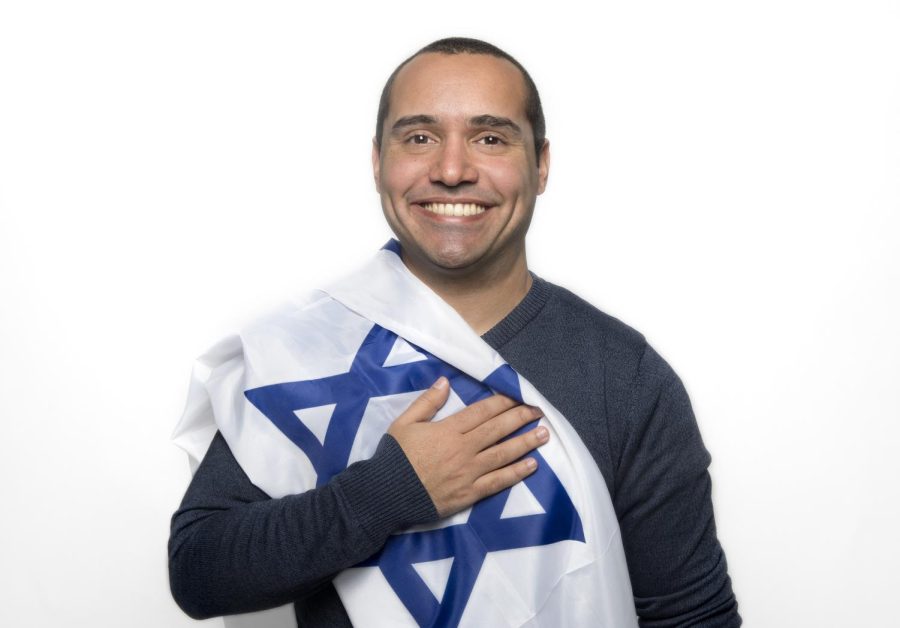Hillel Israel fellow connects Jewish students with cultural roots, hopes to cultivate unity
Aaron Self / The Kent Stater Tomer Yechezkel is in America with the Jewish Agency for Israel fellowship on Kent State University. Tomer likes being in America but says he will always love his home country more.
March 8, 2017
Tomer Yechezkel, a Jewish Agency Israel fellow at Hillel, said he abandoned his life in Israel to help Kent State Jewish students connect to their Israeli roots.
Yechezkel is one of 73 Israel fellows in the United States, and he wants students to connect to Israel and fight false media.
“Having a fellow connects Jewish students to Israeli culture halfway around the world and helps students understand the Jewish connection to the land of Israel,” said Alana Bandos, the student life coordinator of Hillel.
“It is my dream to come and present Israel in a different way,” Yechezkel said.
Before coming to Kent State, Yechezkel said he served in the Israeli army, where he worked as a commander in officer school training and taught soldiers to become officers.
After serving in the military, Yechezkel attended the Hebrew University of Jerusalem to study political science and international studies before working with the Jewish Agency to come to America.
Yechezkel said everyone serves in the military before attending college, so Israeli people have a better understanding of the world around them.
He said persuading students to care about what is going on in the world around them is one of the biggest challenges he faces as a fellow.
“He leads incredible conversations with students about the culture and political reality of life abroad,” Bandos said.
Yechezkel said he enjoys working with students at Kent State because of the diversity on campus.
Yechezkel picked Kent State because he wanted to go to a regular American city. He has been adjusting to American culture since August.
Since moving to the United States, Yechezkel said he has faced difficulties adjusting to American culture, and he said the language barrier, homesickness, driving and tipping at restaurants were some of his biggest challenges.
He said American colleges are usually larger than those in Israel, which is something he must remember when trying to relate to students.
Yechezkel said he notices a difference in how people act in American colleges, since many Israeli students start college after serving in the military, which makes them more aware of national and international issues.
He said students in America focus more on university life, while students in Israel are more likely to consider outside issues.
In Israel, being Jewish is part of the majority, but in America, being Jewish is part of the minority. Another cultural difference is that most of the rabbis in Israel are men, but at Kent State’s Hillel, they have a female rabbi.
Yechezkel also said while being Jewish is more common in Israel, in America he is considered a minority, and he feels the difference between rabbis in the United States versus Israel is untraditional.
He said this is a dominant cultural difference between Israel and the United States, but Israel is working to recognize all practices of Judaism.
“Hillel benefits from having an Israel fellow because Jewish students, especially those who have never been to Israel, get to experience a whole other part of Judaism that is so important to our history, culture and traditions,” Emily Yehezkel, a junior special education major and Hillel president, said.
Yehezkel brings events to campus to encourage students to think about new ideas and the world around them.
Yechezkel said that everyone has the ability to start a movement, and he wants to push students to realize their potential. Fellows usually stay from one to three years, and Yechezkel said he felt he would benefit students most since they are more open-minded.
“Tomer’s presence on campus helps guide the Israel conversation and positively impacts a small town such as Kent,” Bandos said.
Following election season, Yechezkel said that students recognize the importance of going out of their comfort zone.
“If you care about your future, don’t be afraid to say something,” Yechezkel said.
Yechezkel taught the same lesson to his soldiers and said, “Don’t take anything for granted. Nothing is given to you.”
He said he thinks America is more divided after the election, and he wants to help create unity.
Yechezkel said he didn’t grow up going to the synagogue, but he still follows Judaism and believes that everyone should practice religion however they choose.
He said he wants to make Hillel a welcoming organization for all students at Kent State. He also said he represents himself and not the Israeli government, and he is open to hear all opinions and beliefs.
“He has such a contagious personality. Everyone I know has loved getting to know Tomer,” Yehezkel said.
Megan Ferguson is the student life and religion reporter, contact her at [email protected].

























